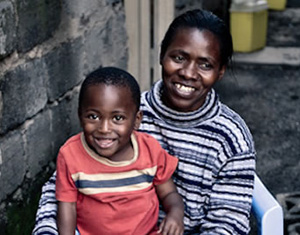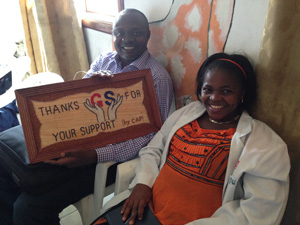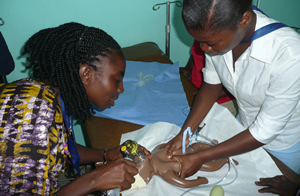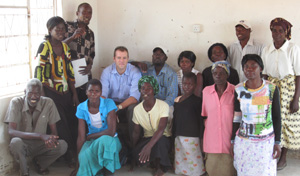A Tale of Two Realities
A guest essay by Art Ammann, the former Director of the Pediatric Immunology and Clinical Research Center at the University of California Medical Center in San Francisco. In 1982, Ammann documented the first cases of AIDS transmission from mother to infant, and also the first blood transfusion AIDS patients. In 1998 he founded Global Strategies for HIV Prevention, where today he ministers around the world. With a special focus on women and children, Global Strategies implements international strategies to prevent HIV infection and to work toward "a generation free of HIV."
For Sunday December 1, 2013
The First Sunday in Advent and World AIDS Day
Lectionary Readings (Revised Common Lectionary, Year A)
Isaiah 2:1–5
Psalm 122
Romans 13:11–14
Matthew 24:36–44
There are times when I read the Psalms that I feel like I'm catapulted between two different realties. Consider these two examples.
Psalm 122
I rejoiced with those who said to me,
“Let us go to the house of the Lord.”
2 Our feet are standing
in your gates, Jerusalem.3 Jerusalem is built like a city
that is closely compacted together.
4 That is where the tribes go up—
the tribes of the Lord—
to praise the name of the Lord
according to the statute given to Israel.
5 There stand the thrones for judgment,
the thrones of the house of David.
6 Pray for the peace of Jerusalem:
“May those who love you be secure.
7 May there be peace within your walls
and security within your citadels.”
8 For the sake of my family and friends,
I will say, “Peace be within you.”
9 For the sake of the house of the Lord our God,
I will seek your prosperity.
But then there's Psalm 10:
Why, Lord, do you stand far off?
Why do you hide yourself in times of trouble?2 In his arrogance the wicked man hunts down the weak,
who are caught in the schemes he devises.
3 He boasts about the cravings of his heart;
he blesses the greedy and reviles the Lord.
4 In his pride the wicked man does not seek him;
in all his thoughts there is no room for God.
5 His ways are always prosperous;
your laws are rejected by[b] him;
he sneers at all his enemies.
6 He says to himself, “Nothing will ever shake me.”
He swears, “No one will ever do me harm.”7 His mouth is full of lies and threats;
trouble and evil are under his tongue.
8 He lies in wait near the villages;
from ambush he murders the innocent.
His eyes watch in secret for his victims;
9 like a lion in cover he lies in wait.
He lies in wait to catch the helpless;
he catches the helpless and drags them off in his net.
10 His victims are crushed, they collapse;
they fall under his strength.
11 He says to himself, “God will never notice;
he covers his face and never sees.”
12 Arise, Lord! Lift up your hand, O God.
Do not forget the helpless.
13 Why does the wicked man revile God?
Why does he say to himself,
“He won’t call me to account”?
14 But you, God, see the trouble of the afflicted;
you consider their grief and take it in hand.
The victims commit themselves to you;
you are the helper of the fatherless.
15 Break the arm of the wicked man;
call the evildoer to account for his wickedness
that would not otherwise be found out.16 The Lord is King for ever and ever;
the nations will perish from his land.
17 You, Lord, hear the desire of the afflicted;
you encourage them, and you listen to their cry,
18 defending the fatherless and the oppressed,
so that mere earthly mortals
will never again strike terror.
On the one hand, Psalm 122 speaks of a world of hope and peace. It begins with, "I rejoiced with those who said to me, ‘Let us go to the house of the LORD.’ Our feet are standing in your gates, O Jerusalem. Jerusalem is built like a city that is closely compacted together. That is where the tribes go up, the tribes of the LORD, to praise the name of the LORD according to the statute given to Israel.”
Psalm 10, on the other hand, describes the harsh reality that stems from those who suffer poverty, instability and oppression, causing them to face seemingly insurmountable obstacles, and with no place of refuge. Thus, Psalm 10 begins not with rejoicing or hope or even the option of traveling to a city where the name of God is praised. Instead, it begins with questions. “Why, O LORD, do you stand far off? Why do you hide yourself in times of trouble?”
In a sense, the people of Psalm 122 know where God lives, whereas the people of Psalm 10 are not certain.
 |
The two Psalms also differ in their ending. Psalm 122 conveys optimism that peace and security may be present where people live, and that there can be confidence in saying "peace be within you" and "I will seek your prosperity." But Psalm 10 is more tentative, as if the people are still pleading with God to hear the cries of the afflicted, to encourage them, to defend the fatherless and the oppressed, and to eventually defeat those who terrorize.
This year the theme of World AIDS Day, an annual event, is "Getting to zero: zero new HIV infections. Zero discrimination. Zero AIDS related deaths.” It's meant to call attention to the magnitude of the global HIV epidemic. The Psalmists would have been more cautious if they had written the World AIDS Day theme. Undoubtedly, they would have recognized the extraordinary progress that has been made in controlling the HIV epidemic.
But they also would have recognized that there is uncertainty even in the most desirable of goals, and thus the subjunctive sense of “may” in Psalm 122: “May there be peace within your walls and security within your citadels."
And certainly the reality of Psalm 10 would be acknowledged, especially for women and children in the most impoverished regions of the world, who continue to be infected with HIV against their will, and who have little to no access to treatment some 25 years after the first treatment for HIV was discovered. The Psalmist perhaps would have asked, “Why do public health officials stand far off? Why do they hide themselves from us in our times of trouble?”
 |
It is necessary for us to acknowledge the two realities spoken of in Psalm 122 and Psalm 10, and how they affect our beliefs — whether spiritual, political or social. As we enjoy our world of more tangible and hopeful outcomes in peace and health, we must not forget that there is a world that is deeply troubling, where peace and hope are more difficult to achieve.
And yet, as the Psalmist writes, "You hear, O LORD, the desire of the afflicted; you encourage them, and you listen to their cry, defending the fatherless and the oppressed, in order that man, who is of the earth, may terrify no more.” What is so incredible about what we believe is that God is present in all circumstances, offering a refuge to all in need.
Image credits: (1–4) Global Strategies.







